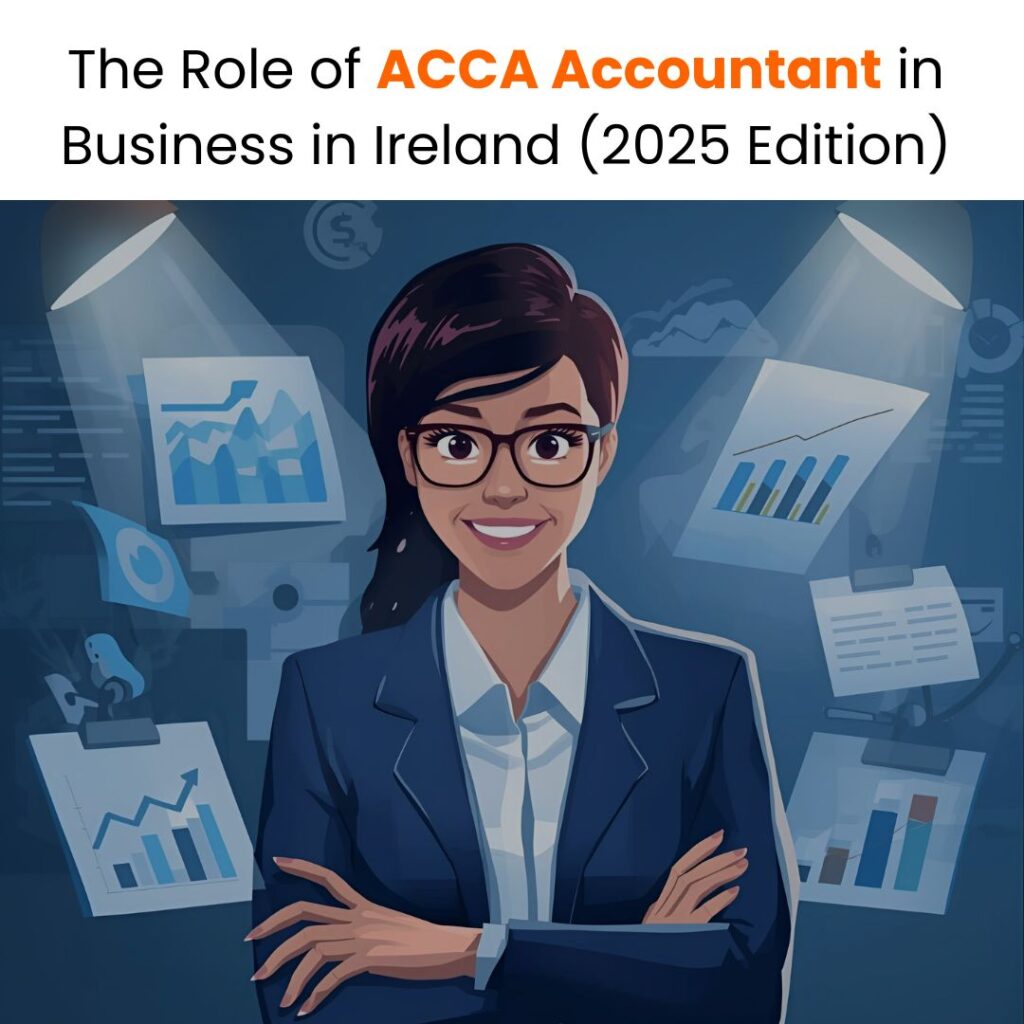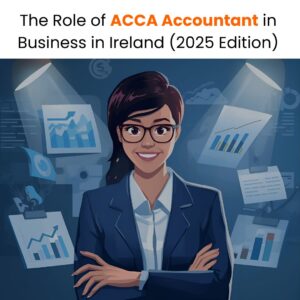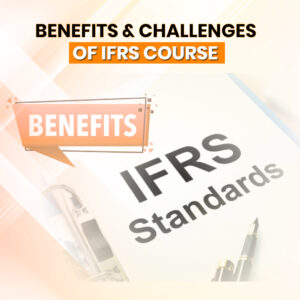Accountants always have a very important role in business, but in 2025,the role of an accountant in businesses in Ireland is more versatile and visible than ever before. Those are the days when accounting is only related to number crunching at the end of the month. Today, ACCA professionals sit at the intersection of finance and technology, strategy and suitability. They help Irish businesses navigate regulatory change, digital disruption, and global markets. This article unpacks what that role looks like now, how the ACCA accountants in business in Ireland add value, and what students and employers should know about the updated syllabus, exam structure, and study resources.
From transaction processor to business partner
Modern ACCA-trained accountants are expected to be business partners first and number-crunchers second. In Ireland, where small and medium enterprises (SMEs), multinational exporters, and Fintech startups coexist, accountants are frequently called on:
- translate financial data into strategic recommendations (cash flow planning, pricing, and investment evaluation).
- Advise on the governance and compliance in an evolving regulatory environment.
- lead cross-functional projects (ERP) rollouts, cost transformation, and sustainability reporting.
- Use data analytics to spot growth opportunities and risks early.
This shift is deliberate: The ACCA business and technology (BT) syllabus focuses not just on accounting mechanics but on understanding organisations, stakeholders, governance, and the role of technology. Hence, preparing graduates to solve real business problems in reality.
What is new in 2025 and why it matters for business in Ireland
ACCA 2025 syllabus and exam updates put practical workplace skills front and centre.Key themes include digital skills, sustainability, and a clear focus on professional judgements. Changes that directly affect the way ACCA accountants operate in Ireland:
Syllabus modernisation
The syllabus updates in 2025 and learning outcomes around financial reporting detail, digital skills, and sustainability considerations. So accounts are better equipped to interpret evolving standards and support disclosures
Fewer but more relevant assessments
The structure of the qualification has been streamlined to reduce the supplication and increase the job readiness, with electives that reflect market demand(data sustainability). That means the Irish employers get candidates with targeted practical skills.
Applied on-demand testing
Many of the applied knowledge exams (like ACCA F1 paper/business and technology) are delivered as computer-based exams with objective test formats. So testing is more flexible and mirrors workplace decision-making under time pressure. This is worth noting for students in Ireland planning the exam strategy.
The ACCA business and technology (BT) syllabus: foundation for real-world impact
The ACCA Business and Technology (BT) syllabus (sometimes referred to historically as F1) remains a foundational paper for those who will work in business roles. It covers the purpose and types of business, stakeholders, governance, basic finance, and the impact of the external environment (economic, legal, technological). For businesses in Ireland, this translates into accountants who can:
- advise management on regulatory influences (e.g., tax, employment law) affecting operations
- help small businesses structure governance and internal controls
- serve as a bridge between finance and functions like HR, IT and operations.
If you’re preparing for the ACCA F1 paper in Ireland, expect the BT syllabus to test scenario-based understanding of business contexts, so focus your studies on applying concepts, not rote memorisation.
- Digital fluency, familiarity with ERPs, automation tools, and basic scripting or data querying to automate routine tasks.
- Advisory mindset proficiency in scenario modelling, risk assessment, and strategic planning.
These skills are reflected in ACCA’s updated learning outcomes for 2025 and are covered across the Applied Knowledge and Applied Skills stages. Employers hiring ACCA accountants in Ireland should specify these competencies in job specs and during practical experience sign-offs.
Value for practical skills for employers in Ireland
Employers in Ireland value accountants who bring practical and modern skills.
Sustainability and non-financial reporting
Accountants help in measuring the report and advise on environmental and social metrics. This is valuable as EU and national regulations tighten.
Data literacy and analytics
The ability to extort insights from the management information system and present them persuasively to the non-financial stakeholders.
How the ACCA is structured in Ireland affects preparation
Understanding of the exam formats helps candidates align their studies with the role they aspire to work in.
The qualification still flows through applied knowledge, applied skills, and strategic professional stages, but the 2025-26 changes emphasise a few overlapping topics and more workplace-relevant outcomes.
Many applied knowledge papers(including BT/F1) are delivered as computer-based exams (CBEs) with question types like multiple choice, multiple response, and number entry. Practice under the CBE condition is mandatory.
Timetabling and exam delivery in Ireland mirror the ACCA global setup, but the students should check local ACCA pages for Irish exam centres, fees, and deadlines. The ACCA Ireland fees and registration guidance remain the authoritative source for country-specific logistics.
Study resources in Ireland where to focus
For effective preparation in 2025, students should combine official ACCA materials with local support
To prepare effectively in 2025, students should combine official ACCA materials with local support:
Official ACCA syllabuses and study guides
Always your first stop for syllabus updates and detailed learning.
- CBE platforms simulate the actual exam environment to master the time management and question types(accaglobal.com).
- Local tuition providers and peer study groups in Ireland are an addition to practical context, exam techniques, and networking.
- Online micro courses in data analytics and sustainability are being repeated to build the complementary skills employers value
Mentioning the specific Irish providers is useful, but always cross-check course dates and fees on provider sites and ACCA Ireland pages.
Conclusion
The modern ACCA accountant in business in Ireland is a combination of accountant, advisor, and technologist. For Irish businesses, employing ACCA qualified accountants today means a professional who can translate regulations and market changes into practical plans, support digital and automation programs, and drive suitability reporting and assist in measuring long-term value. For the students and early career professionals, concentration on the ACCA business and technology, training with the computer-based exam simulations, and developing hands-on skills in data and sustainability.
Frequently asked questions
What are the primary responsibilities of an ACCA-qualified accountant working in business in 2025?
An ACCA-qualified accountant in Irish business holds a strategic and multipurpose role. Their main responsibilities extend far beyond traditional bookkeeping. Key duties include financial strategy and planning, performance management, risk management and governance, and sustainability reporting.
What is the salary and career progression that ACCA professionals expect in Ireland?
Salaries for the ACCA professionals in Ireland are highly competitive and vary significantly based on experience sector ( for example, financial services, tech, and industry) and location (Dublin generally commands higher salaries)
How important is technology and data analysis for an ACCA accountant in the Irish business environment today?
It is extremely important in 2025 that Irish businesses change, and technology proficiency is no longer a nice-to-have, but it is a core competency





